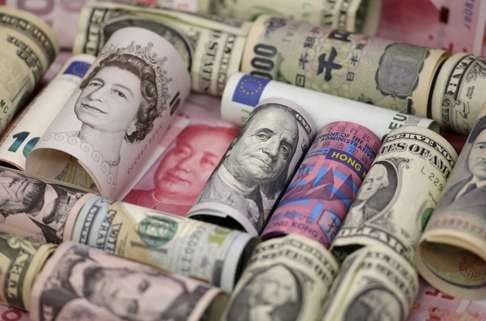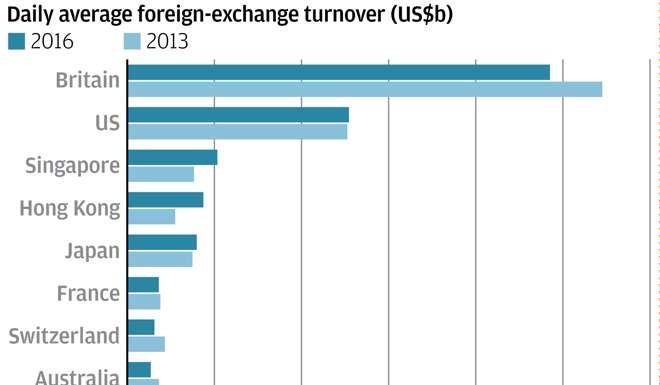
Hong Kong edges out Tokyo as world’s fourth largest forex hub
City’s status as a major forex hub clouded by uncertainty over the strength of the yuan
Hong Kong has bypassed Tokyo to become the world’s fourth-largest foreign exchange trading centre as of April this year, however the city could soon slip back down the rankings.
Analysts warn that continuing devaluation of the Chinese currency doesn’t bode well for Hong Kong’s future as a forex hub, even as the softening yuan has helped to turnover from currency switching.
Jasper Lo, chief executive of King International, said the expansion of foreign exchange trading and the decline of the yuan deposit pool were due to the same reason - the devaluation of the yuan. The Chinese currency has fallen by 2 per cent against the US dollar this year, adding to a 5.6 per cent drop last year.

“A fall of valuation of the yuan against the US dollar has led many Hong Kong depositors to switch their yuan deposits into the Hong Kong dollar or the US dollar. This has to the drop of the yuan pool in Hong Kong,” Lo said.
The value of yuan deposits in the city has slipped to 667.105 billion yuan as of the end of July, down 33 per cent from 994.109 billion yuan a year earlier, as investors abandon the yuan in favour of stronger currencies.

“Many mainlanders buy Hong Kong insurance policies which are denominated in US or Hong Kong dollars in a bid to escape the valuation loss of the yuan. These capital outflows and the deposit currency exchange all involve foreign exchange trading and that is the reason for the more active foreign exchange trading in Hong Kong,” Lo said.
The average daily foreign exchange turnover in Hong Kong stood at US$437 billion in April this year, up 59 per cent from US$275 billion in April 2013, according to a survey conducted by the Bank for International Settlements (BIS) which has surveyed 59 markets worldwide on the foreign exchange trading every three years since 1995.
London remains at the top of the league tables with US$2.426 trillion worth of forex trading daily, trailed by New York at US$1.272 trillion and Singapore at US$517 billion.
Lo said the growth of Hong Kong’s forex trading was related to exchanging the yuan into other currencies.

“A smaller yuan pool in Hong Kong would make it harder to develop more investment products denominated in yuan,” he said.
He said the survey also showed Hong Kong’s forex market is heavily geared towards the yen and yuan.
Of the city’s forex transactions, about 21.2 per cent involve switching between the Japanese yen and US dollar while the yuan and the US dollar represents 17.4 per cent.
Ken Wong, Asia equity portfolio specialist at Eastspring Investments, said the next few months doesn’t look too promising for yuan-denominated products in Hong Kong.
“Given the solid returns that we have seen in equity markets this year, it is hard to envision that investors will switch their current investments into yuan-denominated products unless they can expect higher returns while also having to adjust for the currency risk as well,” Wong said.
However, Stephen Innes, senior trader at Oanda, said the softening yuan will not be a road block for the development of yuan investment products as investors have a strong demand for hedging tools to manage their risks in yuan investment.
“Let us not rule out the positive from the SDR inclusions which should translate into decent demand for the yuan from both central banks as well as sovereign controlled funds,” Innes said. The yuan is slated to be added as a reserve currency by the International Monetary Fund from next month.
Andrew Fung, executive director of Hang Seng Bank, said China’s continuing efforts to open its capital market, such as allowing international institutional investors to invest in the mainland bond market, is a reason for higher foreign turnover in Hong Kong.
“The sinking pool of yuan deposits will not have a significant impact on RMB internationalisation. The size of the pool will rise and fall with the yuan outlook and it is not a benchmark of development,” Fung said.

